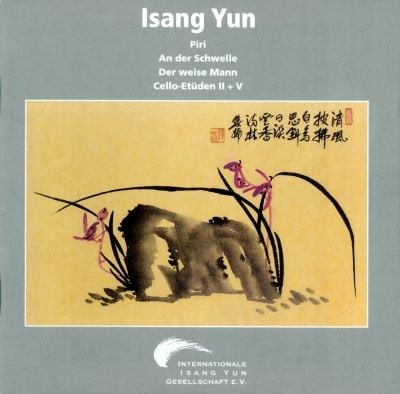1(=afl).1.0.0-1.1.1.0-perc(2):glsp/SD/BD/3tpl.bl/gong/vib/5tom-t/tam-t/whip/maracas/4wdbl-harp-strings
Abbreviations (PDF)
Bote & Bock
The cantata Der weise Mann [The Wise Man] was composed for the Ecumenical Evening of the 17th German Protestant Convention. The text is by Walter Böttcher, the director of the East Asia Work Group in the Berlin Missionary Society. Verses from Lao-tzu are interpolated into the text from the ninth chapter of the Book of Qoheleth.
The Book of Qoheleth (= Ecclesiastes, The Preacher) is a collection of aphorisms from the middle of the third century B.C.E. The Preacher is a skeptic; wisdom seems to be unpleasant toil: "For where there is much wisdom, there is much vexation, and he who learns a lot must suffer greatly." What remains is the Epicurean element: "Enjoy the life ... that you love as long as you have the vain life that God has given you under the sun, for that is your portion in life and in the toil with which you toil under the sun."
His theme is the pointlessness of all seeking. The ninth chapter begins with an exhortation to enjoyment in spite of the vanity of life and then continues with the parable of the relation between wisdom and power set by Yun, about the vanity of wisdom — or, more precisely, of powerless wisdom.
The beginning of Yun’s cantata exhibits narrative elements: the soloist and choir present their roles to the public — Preacher and Voice of the People’s Assembly. Shimmering third tremoli of the strings and woodwinds as well as figurations of the glockenspiel in high registers depict the sun with support from harp sounds. For the Preacher’s report commented on by the choir Yun employs the Schönbergian gradations between speaking and singing, with an initial preference for speech-song.
An oboe solo forms a transition and leads into the parable of the little town. First the choir mentions the poor man (violoncello solo) whose wisdom could have saved the town — and mournfully concludes that nobody thought of him.
The Preacher concludes from this: "Wisdom is better than strength, but the poor man’s wisdom is despised, and his words go unheeded." The comparative "better" is taken up by the choir and considered from various angles.
The great alto flute solo later published separately by Yun with the title Salomo [Solomon] follows reflectively and here is accompanied by a few instruments. A trumpet solo (with harp and stings) then announces the words of Lao-tzu. They serve to enhance the Preacher’s skepticism, and Yun sets them as the dramatic high point.
The strength of the king is immediately relativized; the statement that "straight words" seem to be crooked follows like a shadow. Yun sets the statement that "the words of the wise ... are better than the ruler’s shouting among the foolish" in an accusatory manner. He nevertheless deliberately places the "better" in quotation marks and thus stresses the relative nature of this point of view.
Yun returns to the third trill, the sun metaphor from the beginning, as a transition to the dubious concluding aphorism.
The score was concluded in Berlin-Kladow on May 11, 1977.
Walter-Wolfgang Sparrer (2002, translated by Susan Marie Praeder)

Carl-Heinz Müller (baritone) / members of the Kammerchor Ernst Senff / Instrumental-Ensemble Berlin / Peter Schwarz
Internationale Isang Yun Gesellschaft IYG 004
